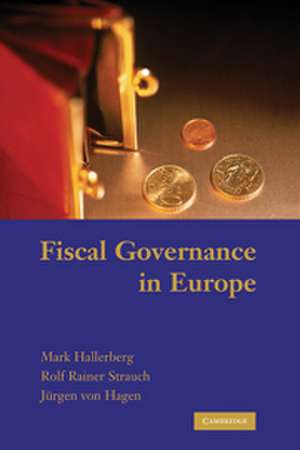Fiscal Governance in Europe: Cambridge Studies in Comparative Politics
Autor Mark Hallerberg, Rolf Rainer Strauch, Jürgen von Hagenen Limba Engleză Paperback – 15 aug 2010
| Toate formatele și edițiile | Preț | Express |
|---|---|---|
| Paperback (1) | 284.01 lei 6-8 săpt. | |
| Cambridge University Press – 15 aug 2010 | 284.01 lei 6-8 săpt. | |
| Hardback (1) | 679.94 lei 6-8 săpt. | |
| Cambridge University Press – 15 mar 2009 | 679.94 lei 6-8 săpt. |
Din seria Cambridge Studies in Comparative Politics
-
 Preț: 179.15 lei
Preț: 179.15 lei -
 Preț: 267.61 lei
Preț: 267.61 lei -
 Preț: 239.36 lei
Preț: 239.36 lei - 9%
 Preț: 594.67 lei
Preț: 594.67 lei -
 Preț: 160.82 lei
Preț: 160.82 lei -
 Preț: 269.58 lei
Preț: 269.58 lei -
 Preț: 264.74 lei
Preț: 264.74 lei -
 Preț: 177.28 lei
Preț: 177.28 lei -
 Preț: 225.70 lei
Preț: 225.70 lei -
 Preț: 164.94 lei
Preț: 164.94 lei -
 Preț: 236.42 lei
Preț: 236.42 lei -
 Preț: 185.64 lei
Preț: 185.64 lei -
 Preț: 233.13 lei
Preț: 233.13 lei -
 Preț: 206.71 lei
Preț: 206.71 lei -
 Preț: 231.82 lei
Preț: 231.82 lei -
 Preț: 206.52 lei
Preț: 206.52 lei -
 Preț: 201.24 lei
Preț: 201.24 lei -
 Preț: 358.37 lei
Preț: 358.37 lei -
 Preț: 203.42 lei
Preț: 203.42 lei -
 Preț: 232.45 lei
Preț: 232.45 lei -
 Preț: 257.82 lei
Preț: 257.82 lei -
 Preț: 191.12 lei
Preț: 191.12 lei -
 Preț: 158.77 lei
Preț: 158.77 lei -
 Preț: 199.05 lei
Preț: 199.05 lei - 11%
 Preț: 553.80 lei
Preț: 553.80 lei - 11%
 Preț: 695.06 lei
Preț: 695.06 lei -
 Preț: 288.80 lei
Preț: 288.80 lei -
 Preț: 262.06 lei
Preț: 262.06 lei - 11%
 Preț: 691.66 lei
Preț: 691.66 lei -
 Preț: 388.29 lei
Preț: 388.29 lei -
 Preț: 288.04 lei
Preț: 288.04 lei -
 Preț: 228.00 lei
Preț: 228.00 lei -
 Preț: 385.28 lei
Preț: 385.28 lei -
 Preț: 312.89 lei
Preț: 312.89 lei -
 Preț: 224.44 lei
Preț: 224.44 lei -
 Preț: 287.07 lei
Preț: 287.07 lei -
 Preț: 251.27 lei
Preț: 251.27 lei -
 Preț: 313.70 lei
Preț: 313.70 lei -
 Preț: 277.38 lei
Preț: 277.38 lei -
 Preț: 423.79 lei
Preț: 423.79 lei - 11%
 Preț: 552.94 lei
Preț: 552.94 lei - 11%
 Preț: 554.43 lei
Preț: 554.43 lei - 14%
 Preț: 783.26 lei
Preț: 783.26 lei
Preț: 284.01 lei
Nou
Puncte Express: 426
Preț estimativ în valută:
54.35€ • 56.40$ • 45.43£
54.35€ • 56.40$ • 45.43£
Carte tipărită la comandă
Livrare economică 15-29 martie
Preluare comenzi: 021 569.72.76
Specificații
ISBN-13: 9780521138260
ISBN-10: 0521138264
Pagini: 246
Ilustrații: 1
Dimensiuni: 150 x 229 x 15 mm
Greutate: 0.36 kg
Editura: Cambridge University Press
Colecția Cambridge University Press
Seria Cambridge Studies in Comparative Politics
Locul publicării:New York, United States
ISBN-10: 0521138264
Pagini: 246
Ilustrații: 1
Dimensiuni: 150 x 229 x 15 mm
Greutate: 0.36 kg
Editura: Cambridge University Press
Colecția Cambridge University Press
Seria Cambridge Studies in Comparative Politics
Locul publicării:New York, United States
Cuprins
1. Introduction; 2. Electoral and fiscal institutions and forms of fiscal governance; 3. An account of fiscal norms and rules in the European Union from 1985 to 2004; 4. How forms of fiscal governance affect fiscal performance; 5. Why do countries have different fiscal institutions?; 6. Institutional choice in new democracies: fiscal governance in Central and East European countries; 7. EMU and fiscal governance in Europe; 8. Conclusion.
Recenzii
Reviews of the hardback: 'Over the past several years, Mark Hallerberg, Rolf Strauch and Jürgen von Hagen have made path breaking contributions on the way fiscal institutions shape budgetary behaviour and on the interplay between fiscal policy and politics in Europe. … [This book] brings together and updates their theoretical and empirical research and provides new insights on fiscal governance in the European Union. As the financial crisis shakes the foundations of policy making in Europe and beyond, this book will help understand why countries' budgetary policies will react in different ways and how fiscal institutions may evolve as a response to new economic and policy challenges.' Marco Buti, Directorate-General for Economic and Financial Affairs, European Commission
'Once upon a time, people spoke of fiscal discipline and indiscipline in Europe. Now, instead, they think in terms of budgetary rules and institutions - a much less normative and more insightful approach. Hallerberg, Strauch and von Hagen are largely responsible for this shift. The present book, summarizing their arguments and evidence, is no less than a classic of the New Public Economics.' Barry Eichengreen, University of California, Berkeley
'A landmark contribution in advancing our understanding of the interactions of political and fiscal institutions and their impacts on fiscal and economic outcomes. In this seminal contribution, Hallerberg, Strauch and von Hagen demonstrate the critical importance of tailoring institutions of fiscal governance (rules, norms and institutions that guide budgetary decision making) to country-specific political environment - such adaptation determines whether political masters serve public interest or pursue heedless self-interest. The book would be an invaluable reference for all thinkers and doers interested in creating public institutions that advance accountable governance while facilitating economic growth with stability.' Anwar Shah, Lead Economist and Program Leader for Governance, World Bank Institute
'In Fiscal Governance in Europe, Hallerberg, Strauch, and von Hagen shed new light on how governments might successfully address the 'common resource pool problem' of debt restraint in the face of political incentives to maximize tax-financed constituency benefits. The answer is centralization of budget procedures through either 'delegation' or 'contracts' institutions. Yet, the authors show that the political context of centralized fiscal institutions is crucial. Where one-party governments prevail, delegation of authority to the finance minister is appropriate. In multiparty systems, the contracts approach of negotiated multi-year targets is the preferred form of centralization. When political context and institutions diverge, benefits from centralization decline. The authors draw on extensive data, including surveys of EU national policy makers, and expertly employ formal methods, econometric analysis and case studies to develop and assess their theory, and to draw compelling conclusions and recommendations for policy makers. Indeed, this excellent book can be strongly recommended to practitioners as well as scholars and advanced students in the areas of public finance and budgeting as well as of political economy, public policy, and comparative and European politics.' Duane Swank, Marquette University
'Once upon a time, people spoke of fiscal discipline and indiscipline in Europe. Now, instead, they think in terms of budgetary rules and institutions - a much less normative and more insightful approach. Hallerberg, Strauch and von Hagen are largely responsible for this shift. The present book, summarizing their arguments and evidence, is no less than a classic of the New Public Economics.' Barry Eichengreen, University of California, Berkeley
'A landmark contribution in advancing our understanding of the interactions of political and fiscal institutions and their impacts on fiscal and economic outcomes. In this seminal contribution, Hallerberg, Strauch and von Hagen demonstrate the critical importance of tailoring institutions of fiscal governance (rules, norms and institutions that guide budgetary decision making) to country-specific political environment - such adaptation determines whether political masters serve public interest or pursue heedless self-interest. The book would be an invaluable reference for all thinkers and doers interested in creating public institutions that advance accountable governance while facilitating economic growth with stability.' Anwar Shah, Lead Economist and Program Leader for Governance, World Bank Institute
'In Fiscal Governance in Europe, Hallerberg, Strauch, and von Hagen shed new light on how governments might successfully address the 'common resource pool problem' of debt restraint in the face of political incentives to maximize tax-financed constituency benefits. The answer is centralization of budget procedures through either 'delegation' or 'contracts' institutions. Yet, the authors show that the political context of centralized fiscal institutions is crucial. Where one-party governments prevail, delegation of authority to the finance minister is appropriate. In multiparty systems, the contracts approach of negotiated multi-year targets is the preferred form of centralization. When political context and institutions diverge, benefits from centralization decline. The authors draw on extensive data, including surveys of EU national policy makers, and expertly employ formal methods, econometric analysis and case studies to develop and assess their theory, and to draw compelling conclusions and recommendations for policy makers. Indeed, this excellent book can be strongly recommended to practitioners as well as scholars and advanced students in the areas of public finance and budgeting as well as of political economy, public policy, and comparative and European politics.' Duane Swank, Marquette University
Notă biografică
Descriere
Based on data from European Union countries, this book presents a theoretical framework to discuss how governments coordinate budgeting decisions.















